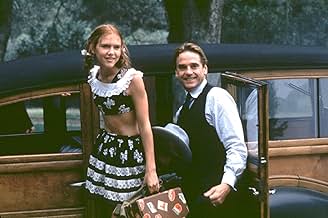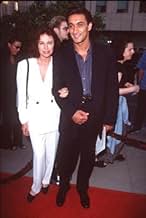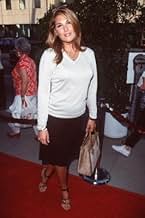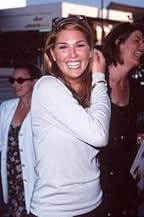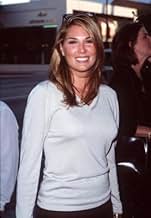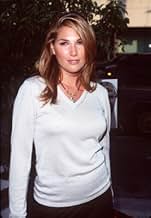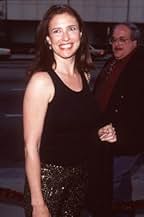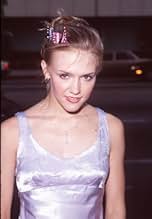Un hombre se casa con la propietaria de una vivienda para poder aprovecharse de su hija.Un hombre se casa con la propietaria de una vivienda para poder aprovecharse de su hija.Un hombre se casa con la propietaria de una vivienda para poder aprovecharse de su hija.
- Dirección
- Guionistas
- Elenco
- Premios
- 2 premios ganados y 4 nominaciones en total
Pat Pierre Perkins
- Louise
- (as Pat P. Perkins)
Emma Griffiths Malin
- Annabel Lee
- (as Emma Griffiths-Malin)
- Dirección
- Guionistas
- Todo el elenco y el equipo
- Producción, taquilla y más en IMDbPro
Opiniones destacadas
I never read Nabokov's novel nor did I watch Kubrick's Lolita, but I liked this one - yes, my feelings sometimes were ambivalent regarding some scenes, but well, I guess that was Nabokov's aim and that of the director. Production is excellent, acting too. A good one that questions in its best moments our perception of reality and our moral values.
Adrian Lyne captures Nabokov's descriptive prose with the film camera. It certainly was not an easy task but Lyne uses some amazing camera angles and well planned shots to reveal subtle motives in the storyline. This movie is worth seeing on the large screen because of its amazing cinematography. The New England landscape is grandiose and very colourful, the images look like they're out of a story book. Jeremy Irons plays Humbert, the hero of this fairytale. Along with Lyne, he creates an introspective and moody character who fills the atmosphere of the movie. I liked this adaptation much more Kubrick's earlier comedy which took a light hearted approach to the novel. I found Lyne paid justice to Nabokov's story and storytelling in this movie.
Briefly put, this film is a quite brilliant adaptation of the novel. While staying pretty faithful to the original source, Stephen Schiff's screenplay fleshes out the primary characters and their relationship, which plays out as a taboo but reserved love story. Maintaining the central themes, the plot is reduced to the essence of the major players and the linear events of the book. It's almost impossible to adapt a long book into the confines of a single average-length movie, but Schiff captures most of the important moments quite well and humanizes the characters who could have come off as bizarre depictions from Humbert's narrative.
Lyne's movie is at once haunting, compelling, and beautifully photographed. For all the controversy, it is a mature, reflective, and subtle film. "Lolita" is a challenging piece of work that sublimely reflects the pathos of the story and manages to retain bits of the complex humor of Nabokov. This "Lolita" abandons the notion of being a complete social satire and works as an essentially dramatic portrayal of a doomed, inappropriate romance that is ultimately a sad, tragic tale.
The performances are remarkable, especially those of Jeremy Irons and Dominique Swain. Irons is utterly perfect as the ill-fated wretch, Humbert Humbert. So understated but evocative with every move and gesture, he is the definitive Old-World European whose obsession bristles beneath his timorous demeanor. He evokes an incredible amount of sympathy for the character. Swain delivers an on-target portrayal of the flowering nymphet who toys with her burgeoning sexuality but hasn't overcome her fundamental brattiness. Swain elicits both allure and pity as the wayward character whose immaturity in mindset and behavior does not excuse her complicity in her affairs. Despite what some critics may have written, Melanie Griffith is fine in the small role as Lolita's overbearing mother. She is comically obtuse, and her veneer hits all the right, grating notes. Frank Langella rounds out the cast as the mysterious Quilty. He is appropriately shady, vague, and sinister when he appears from time to time, slowly revealing himself.
This is a real winner on many levels and should be up for several awards including best picture, director, actor, actress, and adapted screenplay. Showtime should be congratulated for its smart acquisition. I hope the movie finds its way to the largest possible audience.
Lyne's movie is at once haunting, compelling, and beautifully photographed. For all the controversy, it is a mature, reflective, and subtle film. "Lolita" is a challenging piece of work that sublimely reflects the pathos of the story and manages to retain bits of the complex humor of Nabokov. This "Lolita" abandons the notion of being a complete social satire and works as an essentially dramatic portrayal of a doomed, inappropriate romance that is ultimately a sad, tragic tale.
The performances are remarkable, especially those of Jeremy Irons and Dominique Swain. Irons is utterly perfect as the ill-fated wretch, Humbert Humbert. So understated but evocative with every move and gesture, he is the definitive Old-World European whose obsession bristles beneath his timorous demeanor. He evokes an incredible amount of sympathy for the character. Swain delivers an on-target portrayal of the flowering nymphet who toys with her burgeoning sexuality but hasn't overcome her fundamental brattiness. Swain elicits both allure and pity as the wayward character whose immaturity in mindset and behavior does not excuse her complicity in her affairs. Despite what some critics may have written, Melanie Griffith is fine in the small role as Lolita's overbearing mother. She is comically obtuse, and her veneer hits all the right, grating notes. Frank Langella rounds out the cast as the mysterious Quilty. He is appropriately shady, vague, and sinister when he appears from time to time, slowly revealing himself.
This is a real winner on many levels and should be up for several awards including best picture, director, actor, actress, and adapted screenplay. Showtime should be congratulated for its smart acquisition. I hope the movie finds its way to the largest possible audience.
Having read the book and watched the 1962 version some years back, now watching the 1997 version completes my own Lolita experience. This one also pretty well follows the novel but of course some things just are inappropriate to include. Lolita is a brat, sassy, pretty, flirty, manipulative, but Humbert is obsessed. Near the end, before his final encounter with Quilty he goes on about loving Lolita, but what he had was not love, it was carnal obsession. It wrecked him I suppose in the same way that many men have been wrecked over the history of the world.
I found it on Amazon streaming movies.
I found it on Amazon streaming movies.
Nabokov's best novel save for Pale Fire will probably never get an "ideal" filming, unless someone decides to actually commit Nabokov's own script to celluloid (he wrote it for the 1962 version, and his name appears in the credits, but the finished product was almost wholly the product of Kubrick's pen and Peter Sellers' ad-libbing). But I like both the Kubrick and the Lyne versions, with reservations.
With Kubrick's, the only real problem is that it's not Nabokov. James Mason's performance contains the core of an accurate portrayal of Humbert, and he's often moving. But Sue Lyon was too old for her part and Sellers' Quilty is an altogether different conception from the author's (not that he isn't lots of fun). The film also suffers from having been filmed in the UK. Nabokov had a complex vision of America - vast, tacky, seductive, and grindingly mundane all at the same time - and this just can't be conveyed in a studio and with a few well-chosen locations.
That's where Lyne's version excels. His compositions (or his cinematographer's) are indeed beautiful to look at, and (I think) capture suburban and roadside America very much the way Humbert would have experienced them. Irons is fine as Humbert, although the typecasting was initially painful to contemplate, and Swain is a vast improvement over Lyon as young Dolores: still a bit too old for the part (an inevitable problem, perhaps, for anyone who wants to film this book), but her intelligent performance makes up for this. Despite his cheesy reputation, Lyne wisely refrains from making his Lolita a teenage bombshell, something the more artistic Kubrick couldn't resist.
Again, however, the problem is Quilty. Both directors obviously felt compelled to render in three dimensions a character who is one of Nabokov's phantoms: Does he really exist? Who is he and what do we know about him, outside of Humbert's increasingly paranoid imaginings? Can we trust anything at all that's said about him in this book? I expect that Nabokov himself regretted having to bring Quilty out of the shadows at all for the denouement.
Sellers carried off the role with style, making you forget for a moment that his routines seem to have wandered in from another film. Lyne turns the final confrontation between Humbert and Quilty (there is no flashback framing device, as in Kubrick) into pure Grand Guignol, and so we have to endure watching poor, paunchy Frank Langella running down a hallway of his ridiculously overstuffed house, his bathrobe falling open to reveal his endowments to our embarrassed gaze before being blown away Dirty Harry-style by the avenging Humbert. A major wrong note to say the least.
So Quilty, in the end, defeats both of Nabokov's filmic approximators. But if you love the book, see both movies: Kubrick and Lyne each capture different aspects of the master's great story in valuable ways, and the new Lolita is clearly Lyne's best work yet, proving that a great novel can inspire excellent filmmaking, if not guarantee an "ideal" adaptation.
What we really need now, however, is not a third version of Lolita, but finally, a filming of Lolita: A Screenplay. Nabokov had fun writing this, and any fan of his should read his script as well. Wouldn't you like to see a move of Lolita in which Humbert, searching through the woods for his Lo, encounters a butterfly collector named Vladimir Nabokov? Of course you would!
With Kubrick's, the only real problem is that it's not Nabokov. James Mason's performance contains the core of an accurate portrayal of Humbert, and he's often moving. But Sue Lyon was too old for her part and Sellers' Quilty is an altogether different conception from the author's (not that he isn't lots of fun). The film also suffers from having been filmed in the UK. Nabokov had a complex vision of America - vast, tacky, seductive, and grindingly mundane all at the same time - and this just can't be conveyed in a studio and with a few well-chosen locations.
That's where Lyne's version excels. His compositions (or his cinematographer's) are indeed beautiful to look at, and (I think) capture suburban and roadside America very much the way Humbert would have experienced them. Irons is fine as Humbert, although the typecasting was initially painful to contemplate, and Swain is a vast improvement over Lyon as young Dolores: still a bit too old for the part (an inevitable problem, perhaps, for anyone who wants to film this book), but her intelligent performance makes up for this. Despite his cheesy reputation, Lyne wisely refrains from making his Lolita a teenage bombshell, something the more artistic Kubrick couldn't resist.
Again, however, the problem is Quilty. Both directors obviously felt compelled to render in three dimensions a character who is one of Nabokov's phantoms: Does he really exist? Who is he and what do we know about him, outside of Humbert's increasingly paranoid imaginings? Can we trust anything at all that's said about him in this book? I expect that Nabokov himself regretted having to bring Quilty out of the shadows at all for the denouement.
Sellers carried off the role with style, making you forget for a moment that his routines seem to have wandered in from another film. Lyne turns the final confrontation between Humbert and Quilty (there is no flashback framing device, as in Kubrick) into pure Grand Guignol, and so we have to endure watching poor, paunchy Frank Langella running down a hallway of his ridiculously overstuffed house, his bathrobe falling open to reveal his endowments to our embarrassed gaze before being blown away Dirty Harry-style by the avenging Humbert. A major wrong note to say the least.
So Quilty, in the end, defeats both of Nabokov's filmic approximators. But if you love the book, see both movies: Kubrick and Lyne each capture different aspects of the master's great story in valuable ways, and the new Lolita is clearly Lyne's best work yet, proving that a great novel can inspire excellent filmmaking, if not guarantee an "ideal" adaptation.
What we really need now, however, is not a third version of Lolita, but finally, a filming of Lolita: A Screenplay. Nabokov had fun writing this, and any fan of his should read his script as well. Wouldn't you like to see a move of Lolita in which Humbert, searching through the woods for his Lo, encounters a butterfly collector named Vladimir Nabokov? Of course you would!
¿Sabías que…?
- TriviaAs Dominique Swain was a minor at age 15 when the movie was filmed, an adult body double had to be used for most of the sex scenes.
- ErroresCharlotte threatens to "ground" Lolita. Though the term was known to airmen it would not assume its current familiar meaning for many years.
- Citas
[first lines]
Humbert: [voiceover] She was Lo, plain Lo, in the morning, standing four feet ten in one sock. She was Lola in slacks, she was Dolly at school. She was Dolores on the dotted line. But in my arms she was always - Lolita. Light of my life, fire of my loins. My sin. My soul.
[whispered]
Humbert: Lolita.
- Créditos curiososAfter the credits are over there is a brief clip where Lolita is shown juggling a red apple.
- Versiones alternativasThe film was slightly cut to avoid a 'Not under 18' rating in Germany. An uncut version has been released on video.
Selecciones populares
Inicia sesión para calificar y agrega a la lista de videos para obtener recomendaciones personalizadas
- How long is Lolita?Con tecnología de Alexa
Detalles
Taquilla
- Presupuesto
- USD 62,000,000 (estimado)
- Total en EE. UU. y Canadá
- USD 1,071,255
- Fin de semana de estreno en EE. UU. y Canadá
- USD 19,492
- 26 jul 1998
- Total a nivel mundial
- USD 1,071,255
- Tiempo de ejecución2 horas 17 minutos
- Color
- Mezcla de sonido
- Relación de aspecto
- 1.85 : 1
Contribuir a esta página
Sugiere una edición o agrega el contenido que falta


